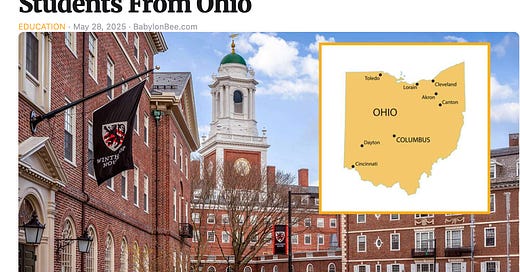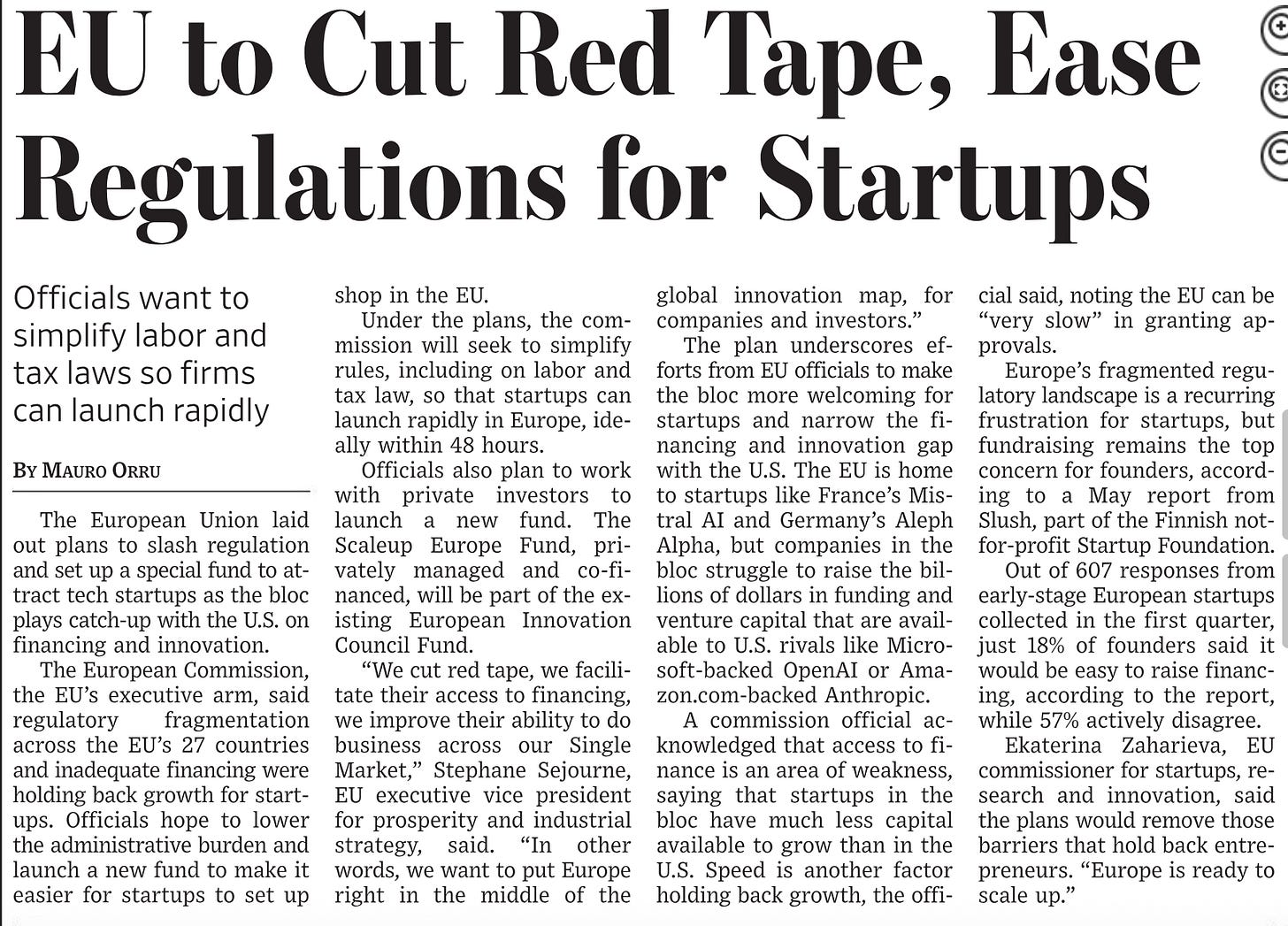I Don’t Get Why Donald Trump Pardoned the Chrisleys--Plus, Regfare News from Europe
Won’t some courageous group host a debate on jobs and Ohio's economy between me and Mike DeWine, Matt Huffman, Rob McColley, Steve Stivers and J.P. Nauseef—I’ll take them all on at once?
I don’t get it. “It” being why Donald Trump pardoned the Chrisleys. Based on everything I’ve read, the Chrisleys did in fact commit the crimes for which they were convicted and neither an appellate court nor the U.S. Supreme Court found their claims of constitutional errors or prosecutorial misconduct convincing. Here is what Alice Marie Johnson, Trump’s pardon czar, stated:
They both received a combined sentence of 19 years for a first-time nonviolent offense and, if you look at their case and how it went down, I'm going to say that, in Georgia, it was truly weaponized...they don't pose a risk to society...I know that they're going to use their voices and their platform to uplift the president's agenda...Have they not only admitted, but are they remorseful for what they've done?
Today, Todd Chrisley not only denied he did anything wrong, but showed no remorse for his role in the frauds that were committed. And frauds were committed—unlike in Trump’s New York case in which all parties involved in the various transactions denied fraud had occurred. Chrisley stated unequivocally, “I still was convicted of something I did not do…I have no shame.” At best, one could argue that the Chrisleys were “over-sentenced” for their crimes, so perhaps a commutation (instead of a full pardon) was warranted.
Even if they were targeted because of their politics, it doesn’t erase the fact that they committed multiple felonies and defrauded banks to the tune of $30 million. Again, a federal jury convicted them (i.e., not a stacked and bias D.C. jury of Democrats) and no appellate court reversed their convictions. As reported:
A three-judge panel of the 11th U.S. Circuit Court of Appeals upheld the couple’s convictions in June but found a legal error in the way the trial judge calculated Julie Chrisley’s sentence, leading to the resentencing hearing. The appellate court ruled that she should not have been held responsible for the entire fraud scheme.
Chrisley’s attorney, Alex Little, urged the judge to reduce her sentence to no more than five years, arguing that she was a minor player in the crimes and highlighting her good behavior during her 20 months in prison. Little noted that she had earned over 70 certificates and described her involvement as "dramatic mistakes.”
However, federal prosecutor Annalise Peters pressed for the full seven-year sentence to be reinstated, arguing that Julie Chrisley was a "core part" of the scheme and had shown no remorse or acknowledgment of her wrongdoing. "Chrisley’s good behavior in prison does not cancel out an ‘11-year journey of fraud after fraud after fraud,’" Peters told the court.
U.S. District Judge Eleanor L. Ross, who presided over the case, declined to reduce the sentence. While she expressed sympathy for the Chrisley children, she emphasized that many people she sends to prison have children and fewer resources than the Chrisley family.
Thus, based on the facts, Trump’s pardons seem ill-advised and make his use of the pardon power as reckless as Joe Biden’s use of it. It also undermines our position that the Right is for equal justice and the Left is for biased justice. The Chrisleys appear to have received a pardon because their politics, fame, and political giving are right, not because they deserved it. What do we now say to the poor and politically disconnected who are rotting away in jail for lesser crimes?
Switching topics…
As frequent readers of this column know, I have long railed against what I call regfare (i.e., regulatory lawfare) being used by the European Union (E.U.) against U.S. companies and their products. My point has been that the E.U. uses regfare to hurt U.S. companies that provide better products in order to help weaker E.U. companies compete. Much of the aim of the E.U. has been at U.S. tech companies like Apple, Google, Amazon, and Meta. I am hopeful Trump and his negotiating team are making ending the use of regfare to hurt U.S. companies a non-negotiable element of their trade talks with the E.U. The chart in the article above shows exactly why the E.U. does what it does—U.S. companies dominate the global landscape, which is why the E.U. is going to make the regulatory burden on its companies lighter in the coming months as noted below.
If the U.S. cuts a trade deal with Europe that DOES NOT cover the use of regfare by the E.U., it will be a meaningless trade deal that the E.U. will get around via regfare. Instead of a tariff or VAT on U.S. goods, the E.U. will simply slap U.S. companies with fines that approximate the amounts lost by agreeing to eliminate tariffs and the VAT. You heard it here first, folks.
P.S. For those keeping track, based on the latest unemployment rate report by the U.S. Bureau of Labor Statistics (BLS), Ohio is the worst state (i.e., has the highest unemployment rate) among Republican states and the 6th worst unemployment rate among all states and the District of Columbia. I’ve hit this issue previously. What say you Governor Mike DeWine, House Speaker Matt Huffman, Senate President Rob McColley, Ohio Chamber of Commerce President Steve Stivers, and JobsOhio President J.P. Nauseef? Won’t some courageous group host a televised debate between me and all of these men—I’ll take them all on at once?
The only potentially—and I use that word intentionally—good news over the last few years were the job reports in February and April of this year when Ohio’s private sector added 28,300 jobs and 20,900 jobs, respectively. Those two readings were far above Ohio’s typical numbers. The “potentially” part comes in because those numbers likely are too good to be true. Specifically, it seems highly unlikely that Ohio’s job total for February totaled 27.8% of ALL JOBS ADDED in America that month. Not even Florida or Texas at their peaks accounted for such a huge percentage of all jobs added in the fifty states. Even April’s total of 11.8% of all jobs added in America seems a tad bit unrealistic given Ohio’s very long history of small additions each month. We won’t know until next March when the BLS does it annual mass revisions whether those numbers were accurate or inflated, but expect a downward revision of those numbers a year from now.
P.P.S. As mentioned in my last column re Ohio being a punchline, it happened again today by the satire website the Babylon Bee. See below.










I don't get why Trump pardoned PG Sittenfeld. He was a smug liberal Democrat who thought he could get away with anything because of his good looks and track record. It sends the message that politicians taking bribes is not that big of a deal. Terrible idea.